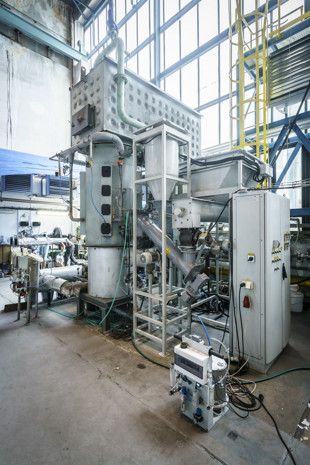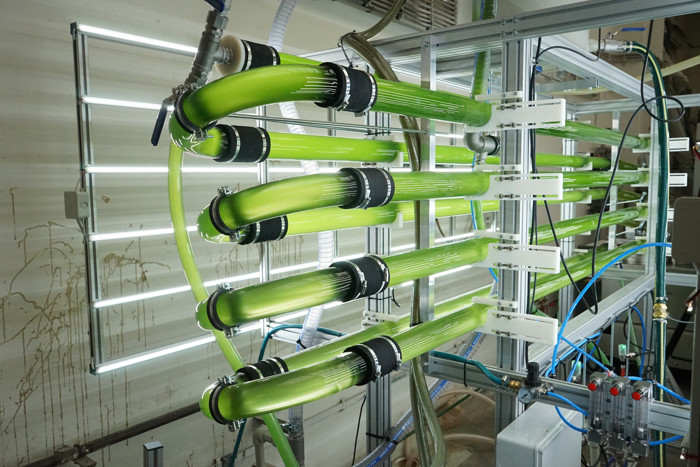Research centre for low-carbon energy technologies – Bio-CCS/U
The Research centre for low-carbon energy technologies is a unique success in the 2016 Excellent research project call within the OP RDE program. The Bio-CCS/U project proposal was awarded the second best position among projects across all fields of sciences and universities in the Czech Republic. In parallel, a success is its scientific focus on the carbon capture and storage (CCS) and utilisation (CCU) technologies that still remain a bit out of interest, even though they are inevitable for a stable low-carbon future of energy generation and industry.
The Bio-CCS/U centre is the only integrated research platform in the Czech Republic that systematically focusses on the CCS/CCU technologies with a special emphasis on biomass as the primary energy source. The centre is coordinated by the Faculty of Mechanical Engineering of the CTU and integrates three departments - Energy Engineering, Process Engineering, and Environmental Engineering. Several other research institutions are involved. Within the CTU it is the Faculty of Nuclear Sciences and Physical Engineering, and outside the CTU are involved Brno University of Technology, VŠB-Technical University Ostrava, and Institute of Thermomechanics of the Czech Academy of Sciences. The centre is supported by individual experts from abroad, e.g. TU Wien (Austria), University of Naples Federico II (Italy), Wroclaw University of Science and Technology (Poland), University of Limerick (Ireland) or TU Dresden (Germany). These experts are directly members of the research teams and strongly enhance the international dimension of the research activities in the centre.


One of the most significant achievements of the centre is the development and completion of the experimental oxyfuel fluidized bed combustion system. It is a technology that allows to obtain highly concentrated CO2 from energy conversion of biomass within a single process. This system was designed and developed by the Bio-CCS/U research team. It is the only one of its kind in the Czech Republic and belongs to a few big research infrastructures in Europe. Being 0.5 MW thermal capacity size, it allows validation of research results on a scale of TRL6 as the primary phase prior to industrial application. In the fluidized bed, oxyfuel combustion technology is investigated further sub-processes that are focused particularly on separation of unwanted components in the CO2 in order to retain its quality for further utilisation. Several achievements have been achieved in this field as well, for example the experimental catalytic block for a high-efficient denitrification or a specially developed injection system of the reducing agent. This pilot-scale oxyfuel combustion system is complemented by its smaller copy that allows fundamental research to be conducted on a significantly broader scale prior to verification on the pilot scale. Similarly, this smaller facility operates under industrially relevant conditions. The fluidized bed oxyfuel combustion technology concerns utilisation of both wooden and nonwooden biomass, taking into account expected development in the use of the energy crops. Several other research activities are coupled with oxyfuel combustion technology. An example is a high-efficiency separation of water vapour, where significant outputs have been reached, such as prototypes of direct and indirect condensation systems that can be experimentally validated with the oxyfuel combustion process. An integral part of the centre's focus are activities for optimisation of oxygen production for the oxyfuel system and investigation of the CO2 utilisation processes, like catalytic conversion to methane or methanol, or its application in photobioreactors. These activities are also strongly experimentally based and are supported by numerical simulations that are used for modelling of the individual processes and their optimisation.
The research and development capabilities of the Department of Process Engineering team were mainly focused on decentralised oxygen production technologies,
carbon capture and utilisation (CCU) technologies and waste pre-treatment for biorefineries. The most significant international
results were achieved in the areas of heat transfer and phase change phenomena in decentralised oxygen production plants.
Research and development in CCU technologies was directed towards the development and application of the combined membrane
X technology and photobioreactors operating under harsh climatic conditions. The research team integrated the research results
into proposals for waste-to-x conversion strategies in sustainable biorefinery pathways. The team also worked on improving
the process efficiency of air, drum and vibrating screens. Mathematical models were developed to predict energy requirements
and particle size characteristics based on mill variables and biomass types (beech chips, wheat straw, textile). All the results
have significantly supported the development of sustainable technologies to support the decarbonisation of industrial processes.

Current policy trends in the EU confirm the relevance and correctness of the idea to emphasise the centre's research programme toward the capture and utilisation of CO2 from biomass as the primary energy source, especially in the context of the Green Deal 2050 targets and associated decarbonisation of industry and energy sectors, related to a significant reduction of CO2 release into the atmosphere. To reach the stability and safety of the energy supply in parallel with the targets of the Green Deal 2050, the CCS/CCU processes will have to become an integral part of the energy production and industry. The Bio-CCS/U research centre focusses a step forward by applying CCS / U technologies on energy conversions of biomass, which is considered as CO2 neutral. With the CCS/U application, the process chain becomes CO2 negative, where the CO2 used by the biomass for its growth is not released back, but is either geologically stored or utilised.

Patent:
Articles:
- Matěj Vodička, Kristýna Michaliková, Jan Hrdlička, Cornelia Hofbauer, Franz Winter, Pavel Skopec, Jitka Jeníková. External bed materials for the oxy-fuel combustion of biomass in a bubbling fluidized bed. Journal of Cleaner Production. Volume 321, 2021, 128882. ISSN 0959-6526. https://doi.org/10.1016/j.jclepro.2021.128882.
- Jan Hrdlička, Jan Opatřil, Matěj Vodička. Bed-to-surface heat transfer in a BFB oxy-fuel combustor. Fuel.
Volume 364, 2024, 131093. ISSN 0016-2361. https://doi.org/10.1016/j.fuel.2024.131093. - Arce, C., Krátký, L. Investigating the effect of process variables for ball milling of wood chips: energy demand and particle size. Biomass Conv. Bioref. 15, 3361–3371 (2025). https://doi.org/10.1007/s13399-024-05283-0
- Pavel Skopec, Jan Hrdlička, Matěj Vodička. Desulfurization in co-firing of sewage sludge and wooden biomass in a bubbling fluidized bed combustor under air and oxy-fuel conditions. Fuel. Volume 342, 2023, 127709. ISSN 0016-2361. https://doi.org/10.1016/j.fuel.2023.127709.
- Havlík, J., & Dlouhý, T. (2023). Improving the energy effectivity of biomass drying for utilisation in energy systems by combining convective and contact drying. Drying Technology, 42(4), 622–635. https://doi.org/10.1080/07373937.2023.2295524
- Kratky, L., Jirout, T. & Belohlav, V. Economic feasibility study for artificial lighting of microalgal flat-panel photobioreactors. Int. J. Environ. Sci. Technol. 20, 12089–12100 (2023). https://doi.org/10.1007/s13762-023-04804-0
- Beneš, M., Eichler, P., Fučík, R. et al. Experimental and numerical investigation of air flow through the distributor plate in a laboratory-scale model of a bubbling fluidized bed boiler. Japan J. Indust. Appl. Math. 39, 943–958 (2022). https://doi.org/10.1007/s13160-022-00518-x
- Vojtech Belohlav, Enrica Uggetti, Joan García, Tomas Jirout, Lukas Kratky, Rubén Díez-Montero. Assessment of hydrodynamics based on Computational Fluid Dynamics to optimize the operation of hybrid tubular photobioreactors. Journal of Environmental Chemical Engineering. Volume 9, Issue 5, 2021, 105768. ISSN 2213-3437. https://doi.org/10.1016/j.jece.2021.105768.
- Pratschner, S.; Skopec, P.; Hrdlicka, J.; Winter, F. Power-to-Green Methanol via CO2 Hydrogenation—A Concept Study including Oxyfuel Fluidized Bed Combustion of Biomass. Energies 2021, 14, 4638. https://doi.org/10.3390/en14154638
- Jan Hrdlička, Tomáš Dlouhý. Full-scale evaluation of SO2 capture increase for semi-dry FGD technology. Journal of the Energy Institute. Volume 92, Issue 5, 2019, Pages 1399-1405. ISSN 1743-9671. https://doi.org/10.1016/j.joei.2018.09.002.
Contact:
prof. Ing. Jan Hrdlička, Ph.D.
Department of Energy Engineering FME CTU in Prague
E-mail: jan.hrdlicka@fs.cvut.cz
Phone: +420 608 339 901
![[design/2014/cvut-logo-en-white.png]](https://fs.cvut.cz/content/images/design/2014/cvut-logo-en-white.png)
![[design/2014/cvut-logo-en-print.jpg]](https://fs.cvut.cz/content/images/design/2014/cvut-logo-en-print.jpg)